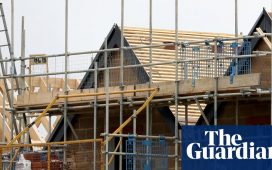Ministers’ plan to clamp down on second-home owners renting properties in England risks hurting local economies without boosting housing supply, estate agents and tourism groups have warned.
Housing secretary Michael Gove on Wednesday proposed giving local councils the power to require owners to obtain planning permission before they can turn an existing home into a short-term rental property.
He said the policy was intended to make housing more affordable and help “local people pushed out of cherished towns, cities and villages by huge numbers of short-term lets”.
But real estate experts warned that the measures were unlikely to reduce house prices in popular tourist areas or spur many second-home owners to sell up, while Gove’s Conservative predecessor described them as “anti-business”.
“It doesn’t matter how you change the planning laws, there will be someone who is willing to pay more money than the locals in order to secure a prime property,” said Christopher Bailey, partner at estate agency Knight Frank.
Frances McDonald, director at estate agency Savills, said limits on holiday lets might cause a “short-term increase” in available properties in some areas but probably not to a level “that leads to a significant increase in supply and improved affordability for local residents”.
Simon Clarke, former housing secretary, said on Twitter that the plans were “anti-business” and that most housing issues nationwide were the result of a “failure to build enough homes”.
But other Tories cautiously welcomed the move. Selaine Saxby, MP for North Devon, called the announcement a “start”, adding that “lack of affordable housing is the number one issue” in coastal areas such as hers.
“The balance between long-term and short-term rentals in coastal areas is out of sync, and the tax system . . . is more favourable to short term,” she said, adding that there was a shortage of teachers and health workers in her constituency because of a lack of affordable homes to buy or rent for a long period.
In December 2022, prime minister Rishi Sunak watered down a pledge to build 300,000 new homes a year, in a bid to stave off a backbench rebellion, by making targets for local councils advisory.
Tourism groups meanwhile warned that the policy risked hurting the domestic holiday economy by restricting the supply of places to stay, thereby pushing up prices.
Richard Toomer, executive director of the Tourism Alliance, a trade body, called on the government to ensure “that policies that result from these consultations don’t throw the baby out with the bathwater”.
“You don’t want to massively reduce the amount of tourism accommodation in areas where the local economy is heavily reliant on a strong tourism industry,” he said.
The consultation on the new rules, which will end in early June, includes considering whether to allow homeowners to rent properties for 30, 60 or 90 nights a year without having to obtain planning permission.
London property owners are already blocked from renting for more than 90 nights each year without prior authorisation.
Theo Lomas, head of government relations, northern Europe at Airbnb, a shared accommodation company, said any planning changes needed to “strike a balance” between ensuring good housing supply and allowing owners to earn incomes from their properties.
The group welcomed a second consultation from the government on creating a register of short-term lets.
Planning experts said the proposed clampdown on short-term lets failed to address the shortage of new houses, which they said was the main reason for the lack of affordable homes.
Alistair Watson, UK head of planning at law firm Taylor Wessing, said there was a “shining opportunity to change the supply side, rather than adding paperwork to a creaking planning system”.











